Are you seeing a 500 internal server error in WordPress?
The internal server error is one of the most common WordPress errors.
It is a bit tricky because the error doesn’t give any other information, many beginners find it quite frustrating.
In this article, we will show you how to easily fix the 500 internal server error in WordPress.
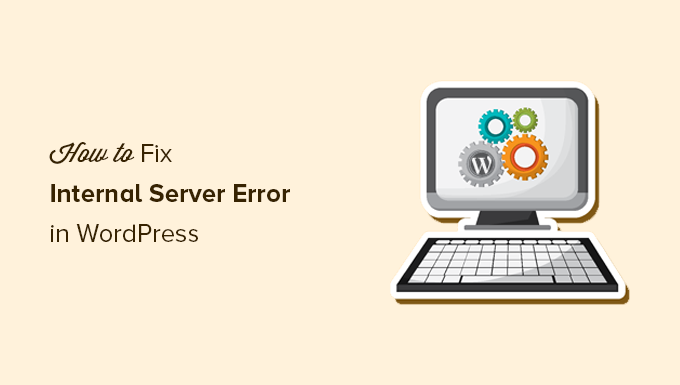
Here is a quick overview of the topics we will cover in this article:
- What Is the 500 Internal Server Error?
- What Causes the Internal Server Error in WordPress?
- Fixing the 500 Internal Server Error in WordPress
- Clear WordPress and Browser Cache
- Checking for Corrupt .htaccess File
- Increasing the PHP Memory Limit
- Deactivate All WordPress Plugins
- Switch to a Default WordPress Theme
- Re-Uploading Core Files
- Enable Debug Logs in WordPress
- Ask Your Hosting Provider
What Is the 500 Internal Server Error?
The 500 internal server error is a common web server error. It is not specific to WordPress and can happen with any website.
The 500 in the error message is technically an HTTP error code. Looking up this code will only show its standard description:
“500 Internal Server Error response code indicates that the server encountered an unexpected condition that prevented it from fulfilling the request.“
This is a generic catch-all error message, which means that the server was unable to assign a better, more helpful error message when it encountered the issue.
The error page looks different depending on which web server software (Nginx or Apache) your website uses and which browser you use.
Here is how the Apache error page may look:
It may look different if you are using Nginx and Google Chrome.
It will also look different if Google Chrome is unable to find an error page to display:
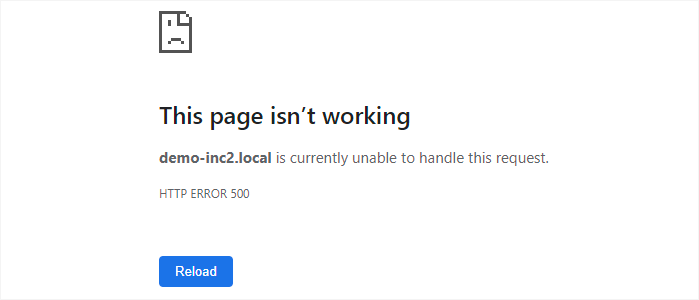
For beginners, this can be incredibly frustrating. No clue or message will point them in the right direction to quickly fix it.
Asking how to fix an internal server error is like asking your doctor how to fix the pain you are experiencing without telling them where the pain is.
However, if you know the common causes that trigger this error, then you can try fixing them one by one to resolve the error without breaking anything.
What Causes the Internal Server Error in WordPress?
Internal server error in WordPress is often caused by a corrupt .htaccess file, poorly coded plugins, or your active WordPress theme.
Other possible causes of the internal server error in WordPress are PHP memory limit or corrupt core WordPress files.
In some conditions, the internal server error may only show up when you are trying to access the WordPress admin area while the rest of the site works fine.
Usually, the error is triggered before WordPress can load and the server cannot get enough information about what stopped it.
To understand more, see our article on how WordPress works behind the scenes.
That being said, now let’s take a look at how to go about troubleshooting the internal server error in WordPress.
Video Tutorial
If you prefer written instructions, then just continue reading.
Fixing the 500 Internal Server Error in WordPress
Before you begin troubleshooting, make sure that you have a complete WordPress backup of your website on hand.
If you have access to the WordPress admin area, then you can use a WordPress backup plugin to create a complete backup of your website.
We recommend using Duplicator to handle this. It not only helps you quickly back up your website, but you can also store your backups on the cloud, and most importantly, you can restore your website from backup.
On the other hand, if you don’t have access to the WordPress admin area, then you can manually create a WordPress backup using phpMyAdmin and an FTP client.
After that, you can follow the following steps to troubleshoot and fix the internal server error on your website.
Clear WordPress and Browser Cache
Browsers and your WordPress caching plugins can sometimes mistakenly store a cached copy of an error page.
The easiest way to fix this is by first clearing your browser cache.
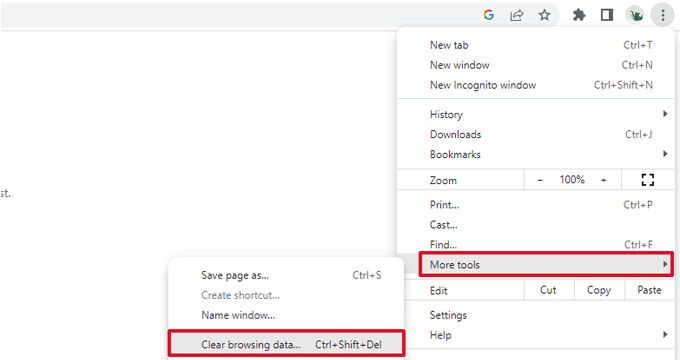
After that, if you have access to the WordPress admin area of your website, then you can empty the WordPress cache by visiting your caching plugin’s settings page.
For details, see our tutorial on how to clear WordPress cache.
Checking for Corrupt .htaccess File
The .htaccess file is a server configuration file that is also used by WordPress to set up redirects.
One of the most common causes of the internal server error is the corrupt .htaccess file.
The easiest way to fix this is by simply visiting the Settings » Permalinks page in the WordPress admin area and then clicking on the ‘Save Changes’ button without making any changes at all.
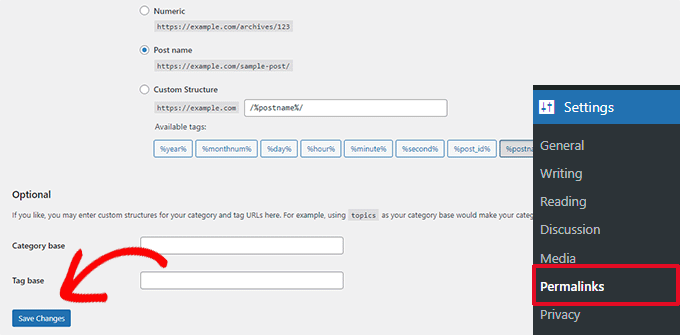
WordPress will now try to update your .htaccess file or generate a new one for you. You can now visit your website to see if this has resolved the internal server error.
If you can still see the error, then you need to make sure that WordPress was able to generate or write to the .htaccess file.
Sometimes, due to file and directory permissions, WordPress may not be able to create or write to your .htaccess file.
You can now try to replace the .htaccess file manually. First, you need to log in to your website using FTP or the File Manager app under your hosting account control panel.
Next, you need to rename your main .htaccess file to something like .htaccess_old. This lets you keep the file as a backup, but WordPress won’t recognize it.
To rename the .htaccess file, you will need to log in to your site using FTP or the File Manager app in your hosting account’s cPanel dashboard.
Once you are connected, the .htaccess file will be located in the same directory where you will see folders like wp-content, wp-admin, and wp-includes.
Simply right-click on the .htaccess file and rename it to .htaccess_old.
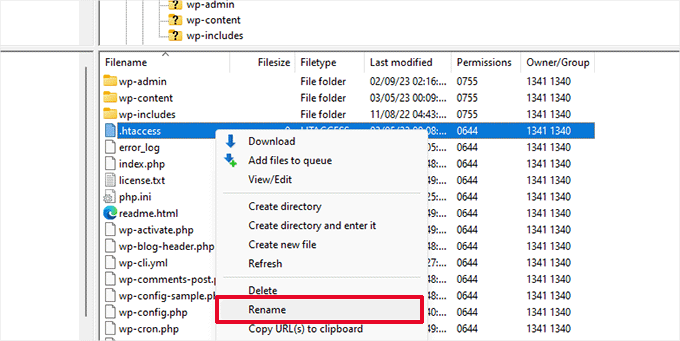
Next, you need to create a new .htaccess file.
Inside your site’s root folder, right-click and then select the ‘Create new file’ option in your FTP client or File Manager app.
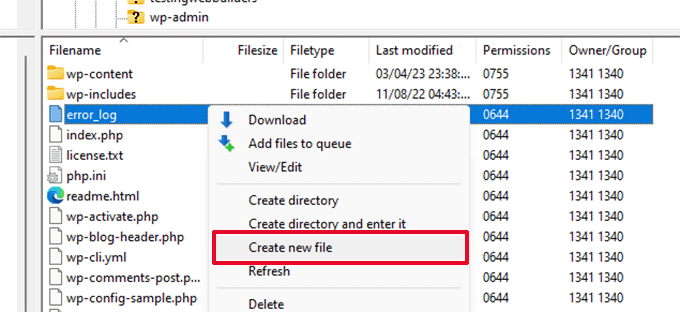
Name this new file .htaccess and click ‘OK’ to save it.
Now, this .htaccess file is currently empty, and you need to add default WordPress rewrite rules to it.
Simply right-click on the file and then select ‘View/Edit’ in your FTP client or File Manager app.
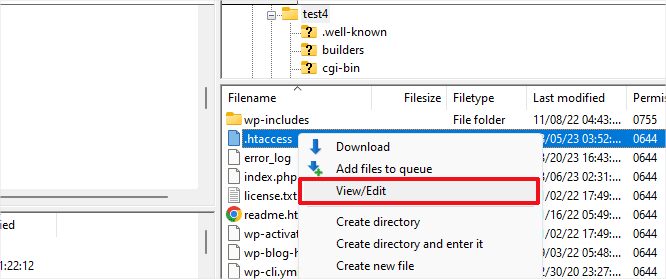
The empty file will open in a plain text editor like Notepad or TextEdit.
Now, you need to copy and paste the following code inside it:
# BEGIN WordPress
<IfModule mod_rewrite.c>
RewriteEngine On
RewriteBase /
RewriteRule ^index.php$ - [L]
RewriteCond %{REQUEST_FILENAME} !-f
RewriteCond %{REQUEST_FILENAME} !-d
RewriteRule . /index.php [L]
</IfModule>
# END WordPress
This code is the default rule set used by WordPress. Don’t forget to save your changes and upload the file back to the server.
You can now visit your website to see if this has resolved the internal server error.
If it did, then give yourself a pat on the back because you fixed the internal server error.
Important: Before you move on with other things, make sure that you go to the Settings » Permalinks page in the WordPress admin area and click the Save button without making any changes. This will regenerate the .htaccess file for you with proper rewrite rules to ensure that your post pages do not return a 404 error.
If checking for the corrupt .htaccess file solution did not work for you, then you need to continue reading this article.
Increasing the PHP Memory Limit
Sometimes, the internal server error can happen if a script consumes all the PHP memory limit.
The easiest way to increase the PHP memory limit is by editing the wp-config.php file. Be careful when you do this if you are a beginner. You want to follow these instructions carefully because even small mistakes in WordPress core files can break your site.
To begin, simply connect to your WordPress website using an FTP client or the File Manager app under your hosting account control panel.
You’ll find the wp-config.php file inside the main folder of your website. Right-click on it and select ‘Download.’ This will ensure that you have a file backup in case something goes wrong.
When you’ve saved that, you can right-click on it and select ‘View/Edit.’
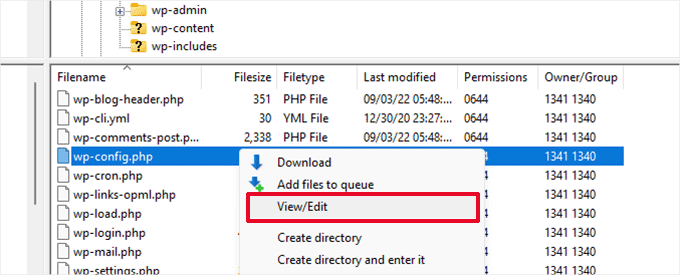
Inside the wp-config.php file, you need to add the following code just above the line that reads, ‘That’s all, stop editing! Happy publishing’:
define( 'WP_MEMORY_LIMIT', '256M' );
For more details, see our tutorial on how to increase the PHP memory limit in WordPress.
Note: If 256M doesn’t solve the problem, then try increasing it to 512M.
If you see the internal server error only when you try to log in to your WordPress admin or upload an image in your wp-admin, then you should increase the memory limit by following these steps:
- Create a blank text file on your computer and name it php.ini
- Paste this code in there: memory=256MB
- Save the file
- Upload it into your /wp-admin/ folder using FTP
If increasing the memory limit fixed the problem for you, then you have only fixed the problem temporarily. You still need to find the cause that is exhausting your memory limit.
This could be a poorly coded plugin or even a theme function. We strongly recommend that you ask your WordPress web hosting company to look into the server logs to help you find the exact diagnostics.
If increasing the PHP memory limit did not fix the issue for you, you are in for more troubleshooting.
Deactivate All WordPress Plugins
If none of the above solutions worked for you, then this error is most likely being caused by a specific plugin installed on your website.
It is also possible that it is a combination of plugins that are not playing nice with each other.
If you can access the WordPress admin area of your website, then you can simply go to the plugins page and deactivate all WordPress plugins.
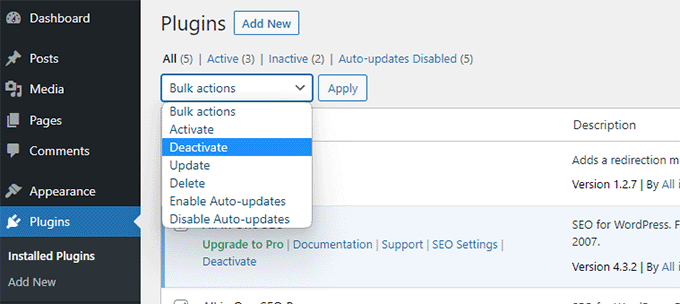
However, if you are unable to access the WordPress admin area, then you can deactivate all WordPress plugins using FTP.
Simply connect to your WordPress website using an FTP client or the file manager app under your hosting account control panel.
Once connected, navigate to the /wp-content/ folder and rename the plugins folder to plugins.deactivated.
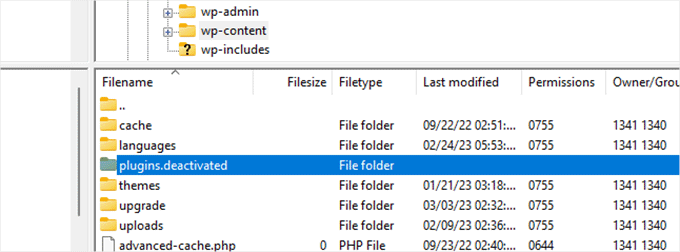
WordPress looks for plugins in the plugins folder. If the plugins folder is not found, it will automatically deactivate all plugins.
You can now try visiting your website to see if this resolved the internal server error on your website.
To restore all your plugins, you can simply rename the ‘plugins.deactivated’ folder back to plugins.
Your plugins will now be restored, but they will still be deactivated.
You can now activate plugins individually and visit your website to figure out which plugin is causing the internal server error.
For more details, see our guide on how to deactivate all WordPress plugins without WP-Admin.
If deactivating all plugins didn’t fix the internal server error on your website, then continue reading.
Switch to a Default WordPress Theme
One possible cause of the internal server error could be some code in your WordPress theme.
To determine if this is the case, you need to switch your theme to a default WordPress theme.
If you have access to the WordPress admin area, then go to the Appearance » Themes page. If you have a default theme already installed, then you can simply click on the Activate button to switch the theme.
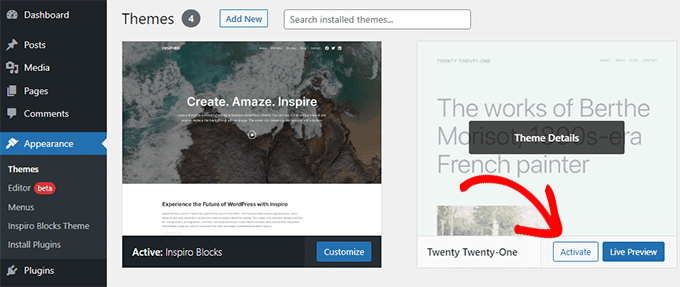
If you don’t have a default theme installed, you can click on the ‘Add New’ button at the top and install a default theme (Twenty Twenty-Three, Twenty Twenty-Two, and so on).
If you don’t have access to the WordPress admin area, you can still switch to a default theme.
Simply connect to your WordPress website using an FTP client and navigate to the /wp-content/ folder.
Right-click to select the themes folder and download it to your computer as a backup.
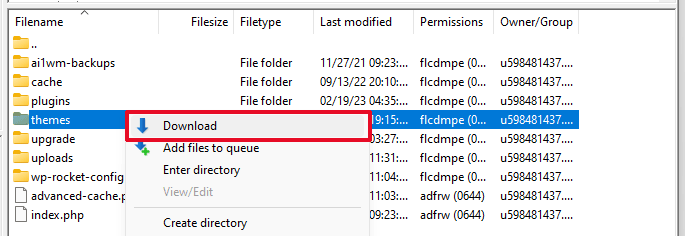
Next, you need to delete the themes folder from your website. Once it is deleted, go ahead and create a new themes folder.
Your new themes folder will be completely empty, which means you don’t have any WordPress themes installed at the moment.
Next, you need to visit the WordPress themes directory and download a default WordPress theme to your computer.
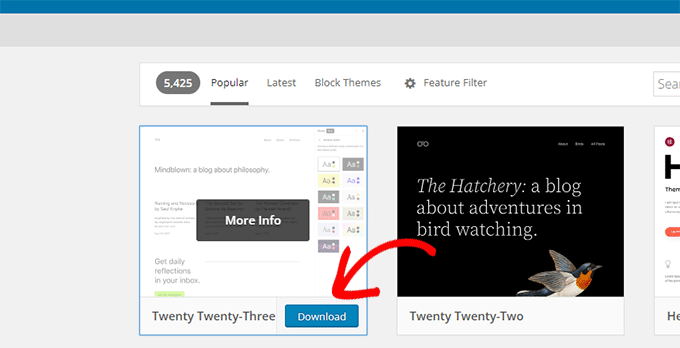
Your browser will then download the theme as a zip file to your computer.
Locate the file on your computer and then unzip it. Windows users can unzip the file by right-clicking on it and then selecting ‘Extract All’. Mac users can double-click on the zip file to extract it.
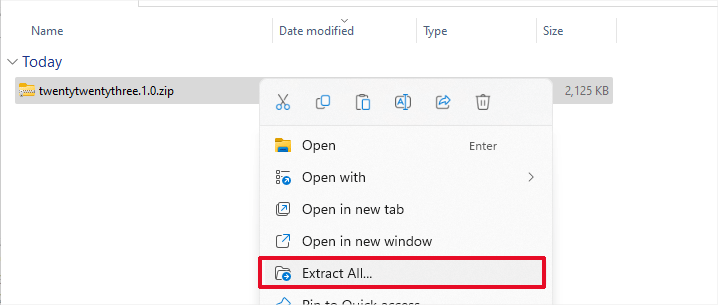
You’ll now see a folder containing your WordPress theme.
Switch back to your FTP client or File Manager up and upload this folder to the empty themes folder.
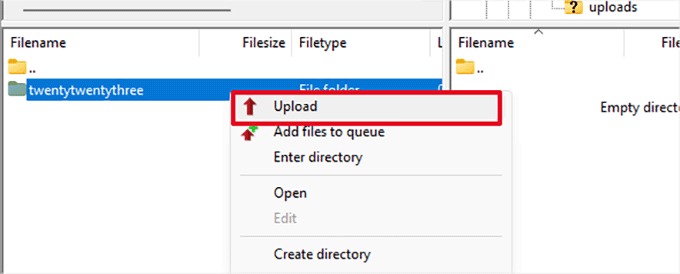
Once uploaded, WordPress will automatically start using the default theme.
You can now visit your website to see if this resolved the internal server error.
If this doesn’t work, then you can reupload your WordPress themes from the backup or switch back to the theme you were using.
Don’t worry. There are still a few more things you can do to fix the error.
Re-Uploading Core Files
If the plugin and theme options didn’t fix the internal server error, then it is worth re-uploading the /wp-admin/ and /wp-includes/ folders from a fresh WordPress install.
This will NOT remove any of your information, but it may solve the problem in case any file is corrupted.
First, you will need to visit the WordPress.org website and click on the ‘Download’ button.
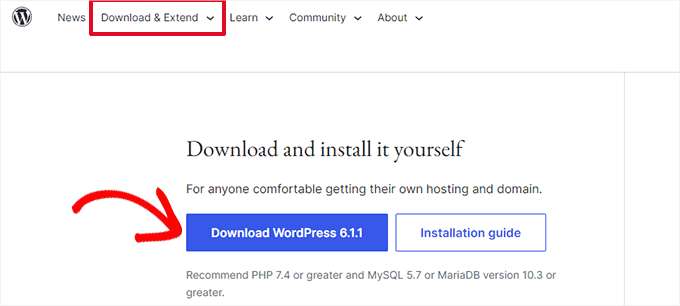
This will download the WordPress zip file to your computer.
Go ahead and extract the zip file. Inside it, you will find a wordpress folder.

Next, you need to connect to your WordPress website using an FTP client.
Once connected, go to the root folder of your website. It is the folder that has the wp-admin, wp-includes, and wp-content folders inside it.
In the left column, open the WordPress folder on your computer.
Now you need to select all files inside the wordpress folder and upload them to your website.
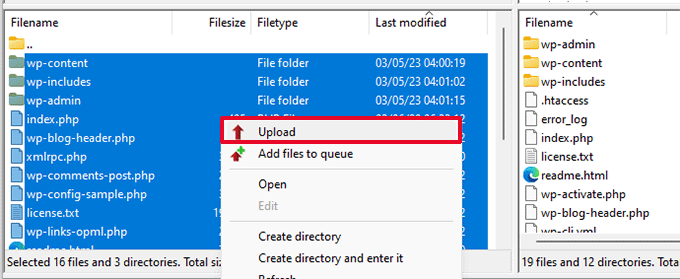
Your FTP client will now transfer those folders to your server.
It will ask you whether you would like to overwrite the files. Select ‘Overwrite’, then select ‘Always use this action’ and check the ‘Apply to current queue only’ checkbox.
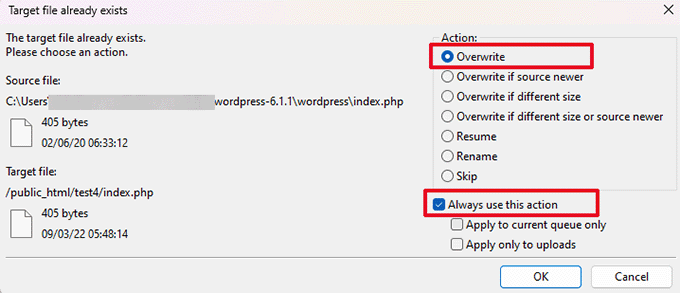
Your FTP client will now replace your older WordPress files with new, fresh copies.
If your WordPress files were corrupted, then this step will fix the internal server error for you.
Enable Debug Logs in WordPress
WordPress comes with a built-in system to keep logs for debugging.
You can turn it on by using the WP Debugging plugin. For more details, see our guide on how to install a WordPress plugin.
Once activated, the plugin will turn on debugging logs on your WordPress website.
If you don’t have access to the admin area of your WordPress website, then you can turn on debugging by adding the following code to your wp-config.php file:
define( 'WP_DEBUG', true);
define( 'WP_DEBUG_LOG', true);
Once you have turned on debug logs, you can view these logs by using an FTP client and navigating to the /wp-content/ folder.
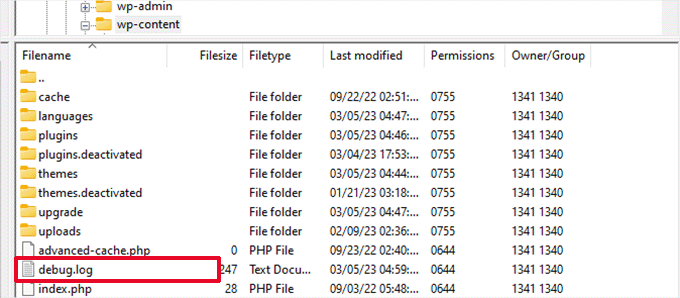
You can open the debug log file in a text editor, and it will show you a list of errors and warnings that occur on your website.
Some errors and warnings can be harmless incidents that may not need fixing. However, if you are seeing an internal server error on your website, then these may point you in the right direction.
Ask Your Hosting Provider
If all methods fail to fix the internal server error on your website, then it is time to get some more help.
Contact your web hosting support team, and they will be able to check the server logs and locate the root cause of the error.
If you want to continue troubleshooting on your own, then see our ultimate WordPress troubleshooting guide for beginners.
We hope this article helped you fix the internal server error in WordPress. You may also want to see our complete list of the most common WordPress errors and our guide on how to choose the best web hosting provider.
If you liked this article, then please subscribe to our YouTube Channel for WordPress video tutorials. You can also find us on Twitter and Facebook.





Syed Balkhi says
Hey WPBeginner readers,
Did you know you can win exciting prizes by commenting on WPBeginner?
Every month, our top blog commenters will win HUGE rewards, including premium WordPress plugin licenses and cash prizes.
You can get more details about the contest from here.
Start sharing your thoughts below to stand a chance to win!
Diogo Susewind says
tks a lot
Increasing the PHP Memory Limit solved my problem
god bless you
Centro Studi Pranici says
Thanks you! Problem solved
Nataša Cvetković says
Thank you so much!
Checking for Corrupt .htaccess File worked for me
Stephen says
My DigiWeb Advanced Hosting Package and 500 server error on activation attempt…
In my case as a beginner and attempting to add a WooWoo theme and then WooWoo eCommerce plugin I had a 500 server error..
The first time after the Theme was installed was rectified by the staff at hosting support.. They pointed out that a web.config file was created, that they renamed it to web.config_old and I was not to create any more.. Proceeding to add the eCommerce plugin and attempting to activate.. 500 error again.. but this time I looked in the directory and there was another ‘web.config’ file.. I changed the name and bingo, all was Ok.. I was happy for I don’t want to be hanging out of the apron of the tech guys at DigiWeb !
I do hope this helps even one person…
Ian Robinson says
I really, really appreciate you putting this video up. Thank you.
WPBeginner Support says
Hey Ian, glad you found it helpful
Don’t forget to subscribe to our YouTube Channel for more WordPress tips and tutorials.
Admin
SAMUEL says
Since i set up my account for both wordpress and Cpanel, i discovered that my domain name on cpanel was not spelt correctly(probably my error) but i have been trying to change it but could not. i need to know the implication of this and how to correct it.my site has been running fine until recently,could it be the cause.
Morse Gates says
I encountered this internal error (500) error when i added this line to my .htaccess
max_input_vars = 1540; but as soon as I remove it , it works. I need to increase my Max_Input_vars from 1000
Please help.
morse gates says
Just additional info. Godaddy asked me to create and use .user.ini to add this, but phpinfo still shows it at 1000 after the change. Its why I decided to use the .htaccess but that send my site to an internal error 500 status.
Elkay says
I hope It is not your disc memory exceeded.
Or error due to syntax.
Samseen says
Thank you, renaming the .htaccess file works for me.
Ammar says
Haylo!
I had this issue today and I figured out the problem was with my file/folder permissions.
I had tried setting all my folders, sub-folder, and file permissions to 777 because I was having major issues uploading images.
This caused the internal server error for me. Switching everything back to 755 fixed it for me, though I’m assuming that simply applying 755 onto the wp-admin folder would have done the job!
Hope that helps someone!
zach says
Yep, the permission changed worked for me so thanks!
Kumar says
Hi i’m facing different type of problem. When i try to load my website it shows ”The mydomain.com page isn’t working” and “mydomain.com is currently unable to handle this request” also “HTTP ERROR 500” (in small font).
Even i’m not able to login in wp admin panel too. what to do? Please help.
I changed the .htaccess file also i thought, may be its happened because of broken config.php file, so i delete it. And when i load my website its start showing the setup configuration setting.
i setp up again, but when its come to login part, same thing happened.
Please help!
WPBeginner Support says
You can try deactivating all WordPress plugins and switching back to a default theme. Let us know if it helps.
Admin
Sherry says
I kept getting a 500 error ‘ [website] is currently unable to handle this request’. After reading through the 500 error advice, I found that a revision I had made to page.php in my theme directory was calling up a print command for a deactivated plugin. I removed the command line and the issue was immediately resolved! Now everything is coming up roses….I mean pages!
piyush saini says
you are really awesome sir thanks for the same
zigii says
thanks! very very helpful resource I resolved my site
WPBeginner Support says
Glad you found it helpful
Admin
Matt says
Mine was none of the above. But I saw in my error logs that wordfence-waf.php had a error in the paths. Renaming wordfence-waf.php in the root folder fixed the issue.
Elkay says
You just hit the nail on the head.
When I had the problem with my site, I first went ahead to check the log.
My hosting support only gave the best they could but I had an opportune moment to solve the problem by myself.
Elkay says
I appreciate the management for the good work, more power to your elbow.
I experienced this error when I was customizing my theme.
The error log gave a clue.
My hosting support only gave the best they could but I had an opportune moment to solve the problem by myself.
Keyboard Banger says
Thanks a lot! helped me regain access to my blog.
Hugo Henriquez says
you can solve the problem by updating the wordpress to the latest version by transferring the “core” files, but before disable all plugins renaming the folder “plugins”
H.T. says
We were getting an “Internal Server 500” error when going to the WP Admin page.
In our case, it was the .htaccess file being corrupt.
Note, though, that deleting .htaccess did NOT fix the problem — in fact, deleting it caused the index page to then have a PHP error, when it had been working fine before. (And that was due to a WP Super Cache error, it seemed — it wasn’t finding the file it was looking for.)
We had ¦ in place of #, and ¤ in place of $ in our .htaccess, for some reason. Fixing those fixed the WP Admin login problem.
Hope it helps someone.
Tim D. says
You rock. How and .htaccess file gets corrupted I’ll never know, but THANK YOU.
Melly P. says
I found an interesting reason for an internal server error after checking my host logs- my wordpress install had group writeable permissions. I had forgotten that I went crazy on my permissions when trying to solve an issue that was being caused by the host. When I changed the CHMOD setting to 755, it was working again. my admin folder is not in the root folder, I wonder if this is why I could still see the website and not be able to access the admin.
Riyaz Alam says
Hi,
as per your suggestion in this post I tried to Re-uploading Core Files(WP-ADMIN & WP-INCLUDES) to fix the 500 error in my website. But now, I am getting again the 500 error and when I contacted my Hosting provider(Hostgator) they send me this log (We have checked and we found there is issue with “akismet”. Please find the log below.
—
[26-May-2016 04:19:04 UTC] PHP Fatal error: Class ‘WP_Widget’ not found in /home/makei3v5/public_html/example.com/wp-content/plugins/akismet/class.akismet-widget.php on line 5) , Now I am helpless, what should I do? I have done the step accurately as per the above guidance.
Please help me out.
Thanks, Riyaz
WPBeginner Support says
Try deleting and then re-installing Akismet.
Admin
Riyaz says
Hi,
Now my site is fixed, but that was not because of deleting and then re-installing Akismet. I had to update the whole WordPress files to get it fixed. Thanks anyways.
David says
Thanks, it was really usefull!
Nazar says
thank you so much author , this was life saviour , job saviour as well.. thanks again
Priyanka says
Thanks for your guideline…I have deactivated all the plugins, but it still shows the same error.
Then I deactivate my theme and it works fine. I realized that theme can create this type of error.
WPBeginner Support says
Yes, now you can ask your theme developer for support or select a different theme.
Admin
WLEXT says
Hello,
What if this problems appears randomly?
Sometimes when I open my website main page, some times when I bulk edit posts. It’s just happens randomly as far as I know, could the problem be that the hosting servers are loaded? because I’m using shared web hosting, I would like to know that if you could answer me?
I don’t want to migrate to another host if the problem is some plug-in in my site.
Please answer me.
Thanks.
Heather says
I would like to know this as well. I have the same issue. It happens sometimes, sometimes not. It can be from the admin panel or from viewing the site directly. I’m also using a very cheap shared hosting service and am wondering if it’s possible this is coming from “their end”.
Geert Spekken says
This article was a true life saver! Or a mental health saver, at least. Turns out a plugin was messing everything up, and thanks to this article I’ve been able to solve it. So many thanks from a relieved WP-beginner (since 2014…)!
WPBeginner Support says
Glad you found it helpful
Admin
Silvia Huerta says
Hi, but my problem is that I cannot enter even to the dashboard, when I try also says internal sever error, so I cannot do nothing. Doesn’t work nothing. I am in panic.
WPBeginner Support says
See our guide on what to do when you are Locked out of WordPress admin area.
Admin
Tarun says
After reading the above mentioned solutions, I went to wp-content/plugins through ftp and sorted the plugins list as last modified and deleted the most recent modified plugin. Problem solved for me.
Thanks
Terry says
In case you are not on a linux server and your hosting is done on IIS (Microsoft Platform) instead, you may have corrupted the web.config file which is used instead of an .htaccess file.
Most servers I use are linux, so I just ran into this problem today on a Microsoft Server. FTP into your site and fix your web.config file.
T.
Jesse says
If you’re hosting WordPress on a IIS (Microsoft Platform) instead of a linux server and have problems updating your WordPress, you need to install this plugin “WP Maximum Execution Time Exceeded’
However the default execution time of the above plugin is 300 ms which you need to increase to 500 or 600 ms to make it work.
Aaron says
Thanks Terry. This was exactly my problem.
Dennis says
The issues started right after adding this to my function.php file in my child theme:
/*** Remove Query String from Static Resources ***/
function remove_cssjs_ver( $src ) {
if( strpos( $src, ‘?ver=’ ) )
$src = remove_query_arg( ‘ver’, $src );
return $src;
}
add_filter( ‘style_loader_src’, ‘remove_cssjs_ver’, 10, 2 );
add_filter( ‘script_loader_src’, ‘remove_cssjs_ver’, 10, 2 );
Haytham says
Thanks, really helpfu
ashish kumbhar says
Thanks, really helpful..
Yasser Ismail says
Thank you very much, you saved me from re installing my site
changing the PLUGINS was the solution and i re installed the faulty plugin
wish you all the best
Yasser
Chris L says
I was getting the 500 Internal Server error when trying to access the ‘Customize’ Menu (button located at the top when viewing your site). It turned out to be a plugin…
The .htacces and php.ini methods didn’t work, in my case, uploading the php.ini file made me unable to access wp-admin until php.ini was deleted.
I apologize I can’t give the name of the faulty plugin, I was in a hurry at the time and needed it to work asap…It was a plugin that added widgets to the SiteOrigin PageBuilder plugin.
Mateo Castano says
Hello guys,
I could access to my wordpress admin panel again deactivating all my plugins from database,
Then I was receiving a problem with an specific pluging, I recommend you to check what pluging is causing issues, in my case was woocommerce and my theme, both installed I was getting an error message about Memory Exceeded, I didn’t find a solution for this error, now I had to separate my page in two wordpress installation, one with all information, and the other with the virtual store,
If anyone find raise of Fatal error: memory exceeded, please let a comment, Thaks for your support guys.
Bye
Peter Posse says
Hallo,
many thanks for that tutorial and all the comments here.
As my hosting is also with Strato I tried the recommandation from Karo A – and it works.
After disabling the cache of PHP Boost at Strato no more Internal Server Error 500 occured.
Might be this cache is running out of memory as I use also Slimstat statistics.
Karo
Karo A says
Hi,
on Strato Websites with PHP 7.0 Power Boost on,wordpress with eg. Jetpack I ve got the 500 server error message.
After checking the Server error log at Strato I found an error message in the log that the PHP handler (CGI) aborted.
After changing the PHP handler (CGI) in the Strato Interface to PHP 7 WITHOUT Power Boost everything works fine!
Best regards
Karo
Reinardt says
Thanks for this, nothing worked but it at least gave me ideas to troubleshoot with. I renamed the theme in the same way to rename the plugins folder eg. themename_deactivate and it worked, I could login to my site again. Still troubleshooting why the theme is acting up all of a sudden.
Gustavo Alves says
Hello, unfortunately my problem continues even after following all his steps.
Would have any idea what could be?
Markus says
Thank you sooo much!!!!!
Roman says
Everything tried but my problem not solved.
I only get NetworkError: 500 Internal Server Error – when I try to login to my site. The browser goes to blank page and I get that error in console.
Please help
Roman says
Please delete my site name??
vm says
Error :NetworkError: 500 Internal Server Error
hi
please cheak you are file( php.ini ) file permission and ownership .
Babatunde says
Useful information you’ve got here. Thank you! My site is back up! Kudos!
Prajjwal says
Thank you……… very much I’ve regenerate .htaccess file and now my site is working properly thanks again for your helpful solution.
James says
Re-uploading Core Files worked for me. Thanks
Raine says
Very helpful guide! I had to re-upload core files to get my pages to work.
Andrew Cook says
Cheers man! Was completely stuck. Very clear and concise instructions. (y) Karma love
yandi novriandi says
my problem not solved on
Mohammed Faisal says
Many thanks, I got my site running again
shehzad says
Great Article. You saved my work. Thanks for this
ITfee says
Great guide! Thank you guys. I just needed to resave my .htaccess file – unbelieveable but true.
Jesper Lindebjerg says
By update using InfiniteWP my site broke down. I tried all above without luck… But in my chase it was a Theme missing. I had to re upload the Mother Theme to get my site back;)
Amanda says
Oh…THANK YOU…THANK YOU SO MUCH!!! That was such a quick fix I’m getting teary-eyed.